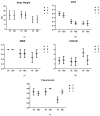Microbiota in Mild Inflammatory Bowel Disease (IBD) Can Be Modulated by Beta-Glucans and Mannanoligosaccharides: A Randomized, Double-Blinded Study in Dogs
- PMID: 39195803
- PMCID: PMC11359447
- DOI: 10.3390/vetsci11080349
Microbiota in Mild Inflammatory Bowel Disease (IBD) Can Be Modulated by Beta-Glucans and Mannanoligosaccharides: A Randomized, Double-Blinded Study in Dogs
Abstract
Inflammatory bowel disease (IBD) in dogs is the most common chronic gastrointestinal disease in dogs. Its etiology evolves an aberrant immunological response towards food antigens and indigenous bacteria in the gut bacteria and, consequently, dysbiosis. Prebiotics provide substrates for the growth of beneficial bacteria and promote the production of beneficial fermentation products. This study aimed to evaluate the effects of oral supplementations of beta-glucans and mannanoligosaccharides (MOSs) over 60 days in fecal microbiota and fecal concentrations of fermentation products in dogs with mild IBD. Eighteen dogs with mild IBD were divided into three experimental groups in a blinded and randomized manner: A-dogs received 0.1% of a beta-glucan-based prebiotic, B-dogs received 0.1% of a MOS + beta-glucan-based prebiotic, and C-dogs received 0.1% of a placebo. Fecal microbiota was analyzed using the latest generation 16S rRNA sequencing (Illumina®). Relative abundances of each taxon were analyzed using a generalized linear model, and fermentation products using a mixed model. A significance level of p was used. The prebiotics positively modulated the bacterial population of Firmicutes and Bacteroidetes. Treatment A improved alpha diversity and populations of beneficial bacteria. Beta-glucan supplementation for 60 days had beneficial effects on modulating intestinal microbiota in dogs with mild IBD.
Keywords: chronic enteropathy; dog; dysbiosis; nutrition; prebiotic.
Conflict of interest statement
The authors declare no conflicts of interest. Fabio Alves Teixeira works as a consultant for companies in the supplementation sector.
Figures









References
-
- Minamoto Y., Otoni C.C., Steelman S.M., Büyükleblebici O., Steiner J.M., Jergens A.E., Suchodolski J.S. Alteration of the Fecal Microbiota and Serum Metabolite Profiles in Dogs with Idiopathic Inflammatory Bowel Disease. Gut Microbes. 2015;6:33–47. doi: 10.1080/19490976.2014.997612. - DOI - PMC - PubMed
-
- Cave N. Nutritional Management of Gastrointestinal Diseases. In: Fascetti A.J., Delaney S.J., editors. Applied Veterinary Clinical Nutrition. Wiley-Blackwell Publishing Ltd.; Hoboken, NJ, USA: 2013. pp. 175–219.
-
- Davenport D.J., Jergens A.E., Remmilard R. In: Inflammatory Bowel Disease. In Small Animal Clinical Nutritional. Hand M.S., Thatcher C.D., Remillard R.L., Roudebush P., Novotny B.J., editors. Mark Morris Institute; Topeka, KS, USA: 2010. pp. 1065–1076.
-
- Blake A.B., Suchodolski J.S. Importance of Gut Microbiota for the Health and Disease of Dogs and Cats. Anim. Front. 2016;6:37–42. doi: 10.2527/af.2016-0032. - DOI
Grants and funding
LinkOut - more resources
Full Text Sources

